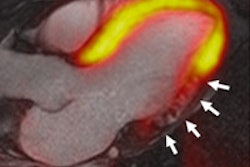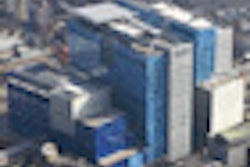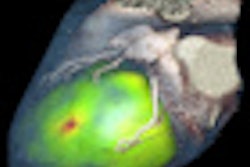Myocardial contrast echocardiography can outperform SPECT for assessing hibernating myocardium in ischemic cardiomyopathy, according to research from Northwick Park Hospital in London.
In a study involving 23 patients, a research team led by Rajesh Chelliah, MBChB, MRC, found that both qualitative and quantitative myocardial contrast echocardiography were independent predictors for detecting hibernating myocardium. The modality was also the only independent predictor for the recovery of left ventricular function.
SPECT is typically used for assessing hibernating myocardium, which is a phenomenon characterized by reduced or absent systolic contraction with persistent and reduced resting perfusion. A hibernating myocardium has a preserved metabolism that is able to recover function following revascularization in patients with severe coronary artery disease, according to the researchers (Journal of the American Society of Echocardiography, July 2, 2010).
Believing that myocardial contrast echocardiography's higher spatial and temporal resolution would provide advantages over SPECT in this application, the research team prospectively followed 39 consecutive patients with symptomatic ischemic cardiomyopathy.
All patients received both technetium-99m sestamibi SPECT and myocardial contrast echocardiography on the same day. SPECT studies were generated using a DS7 large-field, dual-head gamma camera (Sopha Medical Vision, Buc, France). Left ventricular dimensions and ejection fraction values were derived using QGS software from Cedars-Sinai Medical Center in Los Angeles, while myocardial quantification was produced by MyoQuant software, according to the authors.
Echocardiography was performed using Sonos 5500 or HDI CV 5000 (Philips Healthcare, Andover, MA), with intravenous administration of SonoVue (Bracco, Milan) contrast. Quantitative assessment was performed using Philips' QLab software.
Of the 39 patients, 27 underwent revascularization and 12 continued on medical therapy alone, according to the researchers. Twenty-three patients survived to be assessed three months after revascularization for the recovery of left ventricular function.
There were 214 dysfunctional segments, of which 156 demonstrated hibernating myocardium. During follow-up three to six months afterward, 16 patients showed significant improvement in left ventricular function.
From logistic regression analysis, the researchers found that both qualitative and quantitative myocardial contrast echocardiography were independent predictors of hibernating myocardium (p < 0.0001 versus p = 0.06 for qualitative myocardial contrast echocardiography versus qualitative SPECT, respectively; p < 0.01 versus p = 0.25 for all quantitative myocardial contrast echocardiographic parameters versus quantitative SPECT, respectively).
When examining clinical and left ventricular functional data, SPECT, and myocardial contrast echocardiography for predicting the recovery of left ventricular function, the echocardiography technique was the only independent predictor (p = 0.03), according to the authors.
"We have demonstrated that qualitative and quantitative [myocardial contrast echocardiography] is superior to qualitative and quantitative SPECT in detecting [hibernating myocardium] in patients with ischemic cardiomyopathy and predicting the recovery of [left ventricular] function," the authors concluded. "Revascularization of these segments resulted in an overall improvement in [left ventricular] function."
The researchers acknowledged the study was a more of a "proof-of-concept" exercise than a definitive trial. As a result, larger studies are required to validate these results, they said.
By Erik L. Ridley
AuntMinnie.com staff writer
July 26, 2010
Related Reading
Echocardiography test beats SPECT for predicting problems after MI, December 7, 2009
Screening kids with ultrasound, ECG finds cardiac abnormalities, November 17, 2009
Echo plus ECG team up to find heart flaws in athletes, November 16, 2009
Automated segmentation could improve fetal heart echo, November 6, 2009
Routine cardiac stress testing not advised for young adults, August 10, 2009
Copyright © 2010 AuntMinnie.com



















